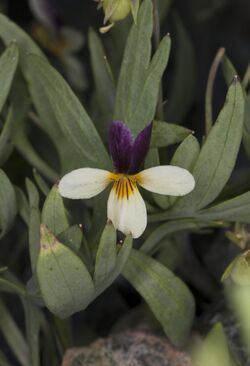Biology:Viola hallii
| Viola hallii | |
|---|---|

| |
| Scientific classification | |
| Kingdom: | Plantae |
| Clade: | Tracheophytes |
| Clade: | Angiosperms |
| Clade: | Eudicots |
| Clade: | Rosids |
| Order: | Malpighiales |
| Family: | Violaceae |
| Genus: | Viola |
| Species: | V. hallii
|
| Binomial name | |
| Viola hallii A.Gray
| |
Viola hallii is a species of violet known by the common names Oregon violet and Hall's violet. It is native to southwestern Oregon and northwestern California , where it occurs in open areas in the forests and chaparral of the coastal mountain ranges, on gravelly soils, often of serpentine origin.[1]
Description
This rhizomatous herb produces a cluster of hairless stems reaching a maximum height of about 22 centimeters. The leaves are each divided into three fleshy leaflets which are deeply divided into lance-shaped lobes and borne on short petioles, very similar to Viola beckwithii. A solitary flower is borne on a long, upright stem. It has five petals, the lower three cream-colored with yellow bases and red veining, and the upper two dark red or purplish.
References
External links
Wikidata ☰ Q7933069 entry
 |

